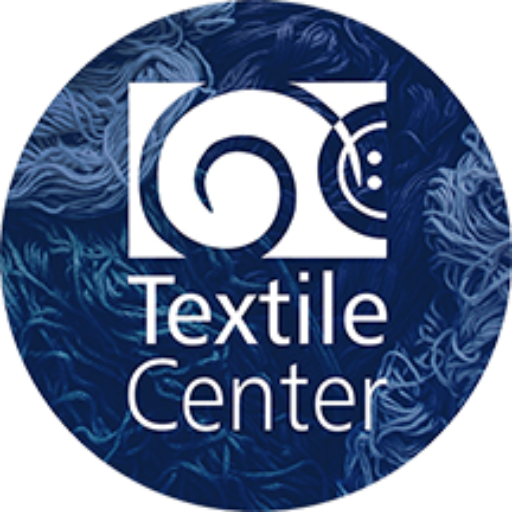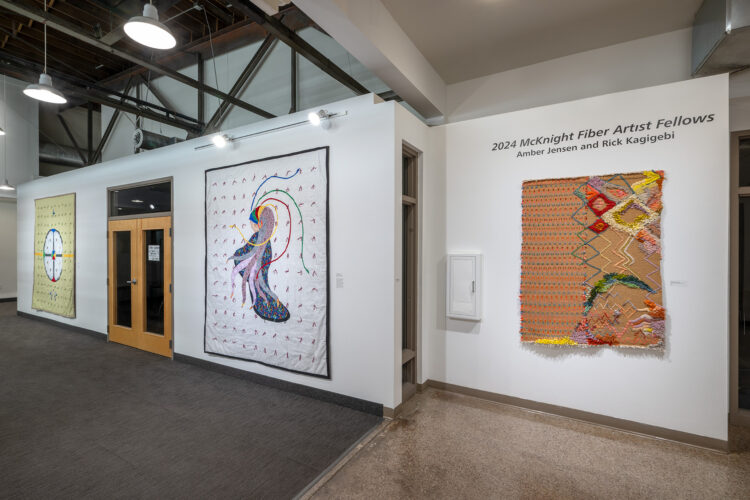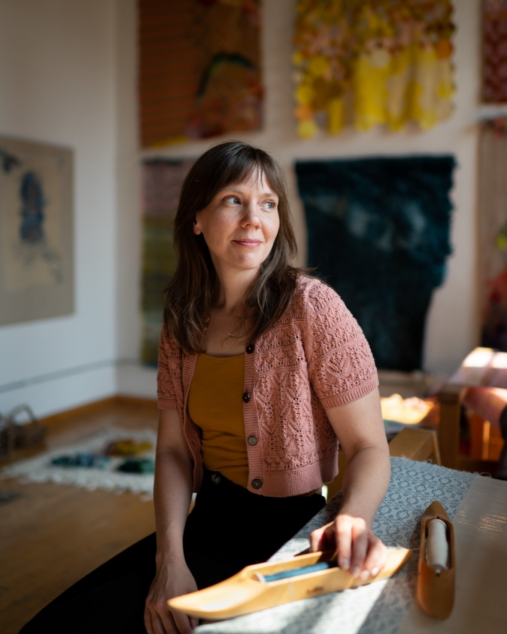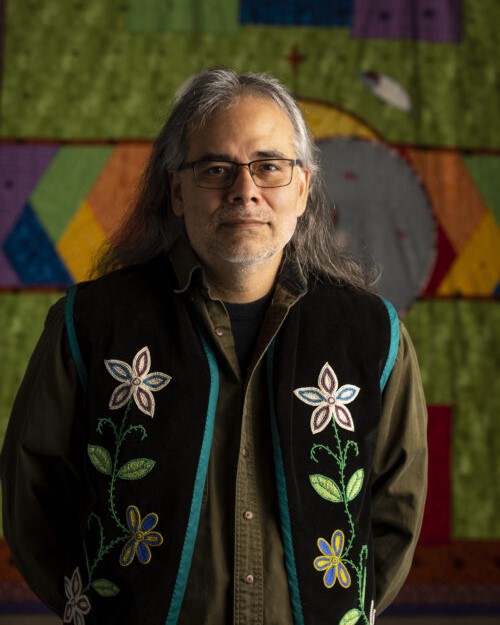- ABOUT US
- About Textile Center & Our History
- Visit Textile Center
- Declaration of Anti-Racism
- Land Acknowledgment
- Staff + Board
- Guilds and Special Interest Groups
- Textile Center Community Partners
- Job, Internship & Volunteer Opportunities
- Auction Item Request Form
- Textiles on the Town (ToT) Newsletter
- Spun Gold Awards
- Official Documents
- EXHIBITIONS
- EDUCATION
- Take a Class
- Art Speaks | Artist discussion series
- Craft Night | Monthly social crafting events
- Join our Book Club
- Fellowship Opportunities
- Book a Private Event at Textile Center
- Book an Offsite Class
- Join our Members Makerspace
- Visit our Dye Garden
- Use the Dye Lab
- Learn about Textile Tours
- Teach with us
- SHOP
- LIBRARY
- DONATE
- MEMBERSHIP
- EVENTS
- VIDEO LIBRARY
2024 McKnight Fiber Artist Fellows:
Fellowship Period:

View the virtual exhibition here:
Amber Jensen
Amber M. Jensen, Minneapolis, is a weaver, painter, and teacher who blends traditional techniques with improvisation to draw new stories out of thread and cloth with each piece she makes. Jensen began her journey into textiles nearly two decades ago with the creation of one-of-a-kind backpacks, which evolved into distinctive wearable art. Through her daily art practice, she creates weavings and paintings embellished with stories and symbols, inspired by nature around her and the through-line traced from her ancestors’ blankets to her work today. Whether people share the same language or not, she believes woven cloth carries history across cultures.
Jensen received a 2009 Jerome Foundation Emerging Artist Grant from the Minnesota Center for Book Arts and has exhibited internationally, from Tokyo to Paris. In 2023, she presented a solo exhibition at the Watermark Art Center in Bemidji. Her work will appear in an upcoming touring exhibition organized by the Middle American Arts Alliance and the Scandinavian-American Foundation, beginning in New York City and traveling through the Midwest with support from the National Endowment for the Arts.
Dedicated to sharing her love of weaving, Jensen has led projects with All My Relations Arts in Minneapolis, the Blandin Foundation in Grand Rapids, the 2024 Art Shanty Projects, and the North House Folk School in Grand Marais. Jensen currently works out of her studio in Minneapolis.
For information on upcoming weaving and backpack making classes, follow her on Instagram!
ambermjensen.com
RECENT and UPCOMING:
Amber’s work is featured in Nordic Echoes- Traditions in Contemporary Art, April 5 – August 2, 2025, Scandinavia House, New York, NY.
Rick Kagigebi
Rick Kagigebi, Lac Courte Oreilles Ojibwe, creates appliquéd mural blankets that incorporate elements such as direction, movement, time, space, 3-dimensional layering, and Ojibwe culture. From sketching to sewing to hand-tying, he considers the person who will receive the blanket, asking what can be provided through the blanket in order for them to have a good life?
Kagigebi made his first blanket, a four-pointed star, on his grandmother’s treadle sewing machine in 1980. Hundreds of blankets followed for ceremony, gifting, commission, and exhibitions. In his 30s and living at the Duluth YWCA without a sewing machine, he hand-stitched appliqué designs using an embroidery hoop. He began showing his work publicly in 2018, having previously limited it to ceremony gifts and private commissions. Of this work, he says, “Why do I do what I do? Because the people are worth doing it for.”
His blankets have been exhibited in Wisconsin, Minnesota, North Dakota, and South Dakota, including All My Relations Gallery (Minneapolis), Watermark Arts Center (Bemidji), and the Wisconsin Museum of Quilts and Fiber Arts (Cedarburg). Kagigebi has received support from Region 2 Arts Council’s Anishinaabe Arts Initiative and two grants from the Lake Region Arts Council, as well as a Minnesota State Arts Board Creative Support for Individuals grant in 2023 and an Arts Experiences grant in 2024. He resides in Detroit Lakes.
For upcoming blanket making workshops for Native youth, teens, and adults, follow and keep up with him on Instagram!
RECENT and UPCOMING:
Rick’s episode of the podcast, 5 Plain Questions, with Joe Williams is finally HERE!!
Join Rick and The Indigenous Arts Collaboration for the Fargo Morehead Visual Artists Studio Crawl, October 5 & 6, from 12 – 6 pm. For more information, click HERE.
Wild Rice Day – White Earth Reservation, Mahnomen MN, Saturday August 24, 10 am – 3 pm. Click HERE for more information.
Rick led three blanket making workshops for youth, July 9 – 12, at Cornerstone in Frazee, MN. For images and information about the workshops: July 9, July 12
Air and Water (solo exhibition), May 3 – June 28, Giinawind Gallery, MacRostie Art Center, Grand Rapids, MN.
9th Annual Plains Art Museum Indigenous Art Fair, April 27 – 28, 2024, Fargo, ND.
Read more about Rick’s work on our Substack!
Plus, check out this MinnPost article: Reluctant elder Rick Kagigebi’s blankets tell stories the Ojibwe way
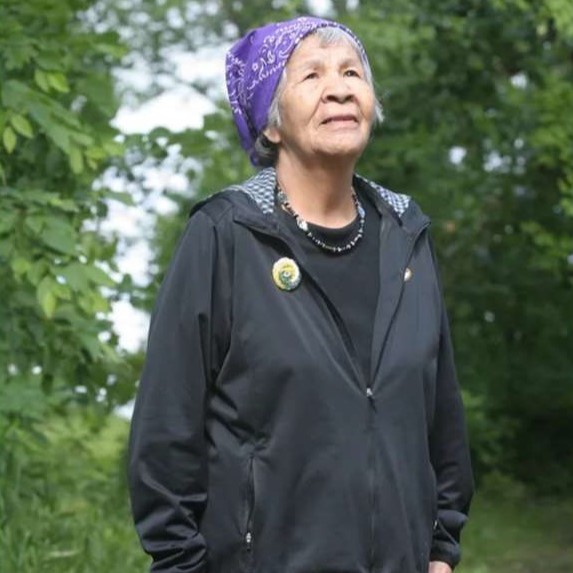
Dora Ammann
Dora Ammann served as a mentor to Rick Kagigebi during the 2024 Fellowship year.
From the article in ICT News, by Mary Annette Pember, The Power of Ojibwe Women, September 13, 2018
https://ictnews.org/archive/power-ojibwe-women
Dora Mosay Ammann, 76, of the St. Croix Ojibwe tribe in Wisconsin is amindemooyenh. She describes her duties as a woman. “We were put here to keep our ceremonies alive,” she says. Ammann, whose Ojibwe name is Ashazhawaagiizhig or Crossing Sky Woman, has been part of traditional spirituality her entire life. “If I am feeling bad, I try to help someone else. The work takes away my worry,” she says. “I meet the spirits early in the morning each day and find out what they have in store for me. This is what sustains me.” She adds, “Without our spirituality we have nothing! So this is what I try to teach the young people.”

M. Rachael Arauz
M. Rachael Arauz, PhD, is an independent curator of modern and contemporary art, with a Ph.D. in art history from the University of Pennsylvania. She has organized exhibitions and contributed to museum catalogues in the United States, Mexico, and Europe for institutions including DeCordova Sculpture Park + Museum, Boston University Art Gallery, the Scottsdale Museum of Contemporary Art, Cranbrook Art Museum, and the Indianapolis Museum of Art. She has presented major solo exhibitions of artists Keith Haring and Julianne Swartz, and her wide-ranging curatorial interests have spanned topics such as mid-century abstraction, Mexican photography, and weaving in contemporary art. Arauz was co-curator of the 2019 exhibition In the Vanguard: Haystack Mountain School of Crafts, 1950-1969 for the Portland Museum of Art, Portland, Maine. In addition to serving as juror and visiting critic for various organizations, Arauz has written for Hyperallergic about her museum experience as a “minority intern” in the 1990s, and was a Visiting Scholar at Virginia Commonwealth University in autumn 2023 in the Department of Craft/Material Studies.
@rachaelcurator

Sheila Dickinson
Sheila Dickinson, PhD, is a curator, art critic, and art history professor focusing on contemporary art. She has published widely on platforms such as Artforum, ART News, The Brooklyn Rail, Hyperallergic, and Hong Kong’s Artomity, among others. She previously held the position of Artistic Director at the Rochester Art Center and is currently the Curator for the Mayo Clinic where she also teaches Mayo medical students visual acuity and compassion through looking at art. With a doctorate in contemporary Irish Art from University College Dublin, her research interests lie in contemporary art, Irish studies, and art history.
@sile.ann.d
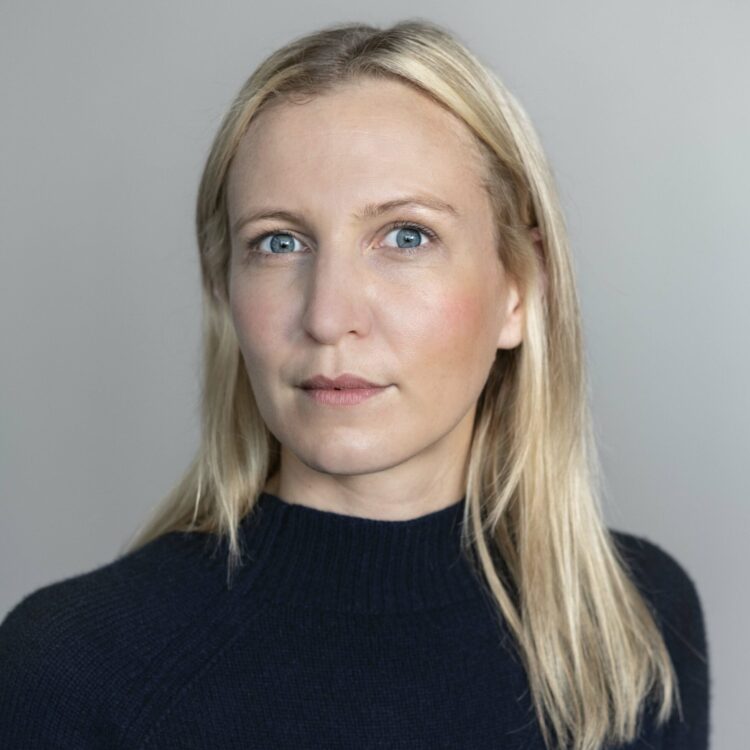
Michelle Millar Fisher
Michelle Millar Fisher, PhD, is the Ronald C. and Anita L. Wornick Curator of Contemporary Decorative Arts within the Contemporary Art Department at the Museum of Fine Arts, Boston. Her work focuses on the intersections of people, power, and the material world. At the MFA, she is working on her next book and exhibition, tentatively titled Craft Schools: Where We Make What We Inherit, which took her across 48 contiguous US states via train over the course of a year. She is also the co-founder of the Designing Motherhood project and has long been interested in the confluence of gender and design. She has written widely on care work, mothering, and reproductive labor, including parenting in museums, hiding care work at work, being childfree, grief and mothers, and the architecture of maternity. Previously, she worked at the Philadelphia Museum of Art, The Museum of Modern Art, the Metropolitan Museum of Art, and the Guggenheim Museum. The recipient of an MA and an M.Phil in Art History from the University of Glasgow, Scotland, she is currently completing her doctorate in art history at The Graduate Center at the City University of New York (CUNY). She is part of the 2022 fellow cohort at the Center for Curatorial Leadership.
michellemillarfisher.com

M. Rachael Arauz
M. Rachael Arauz is an independent curator of modern and contemporary art, with a Ph.D. in art history from the University of Pennsylvania. She has organized exhibitions and contributed to museum catalogues in the United States, Mexico, and Europe for institutions including DeCordova Sculpture Park + Museum, Boston University Art Gallery, the Scottsdale Museum of Contemporary Art, Cranbrook Art Museum, and the Indianapolis Museum of Art. She has presented major solo exhibitions of artists Keith Haring and Julianne Swartz, and her wide-ranging curatorial interests have spanned topics such as mid-century abstraction, Mexican photography, and weaving in contemporary art. Arauz was co-curator of the 2019 exhibition In the Vanguard: Haystack Mountain School of Crafts, 1950-1969 for the Portland Museum of Art, Portland, Maine. In addition to serving as juror and visiting critic for various organizations, Arauz has written for Hyperallergic about her museum experience as a “minority intern” in the 1990s, and was a Visiting Scholar at Virginia Commonwealth University in autumn 2023 in the Department of Craft/Material Studies.
@rachaelcurator

Rowland Ricketts
Rowland Ricketts utilizes natural dyes and historical processes to create contemporary textiles that span art and design. Trained in indigo farming and dyeing in Japan, Rowland received his MFA from Cranbrook Academy of Art in 2005 and is a Professor in Indiana University’s Eskenazi School of Art, Architecture + Design. A recipient of United States Artists & Smithsonian Artist Research Fellowships, his work has been exhibited at the Museum of Fine Arts Boston, the Smithsonian American Art Museum’s Renwick Gallery, the Cleveland Museum of Art, the Seattle Art Museum, the Museum of Contemporary Art- Jacksonville, and the Denver Botanic Gardens.
rickettsindigo.com
@rickettsindigo

Namita Gupta Wiggers
Namita Gupta Wiggers is an educator, writer, curator, and artist based in Portland, OR. Wiggers founded and directed the MA in Critical Craft Studies, Warren Wilson College from 2017-2023. Wiggers directs and co-founded Critical Craft Forum, and served as the Director and Chief Curator, Museum of Contemporary Craft, Portland, OR from 2004-2014. Her most recent publication is This is not a Retreat, co-edited with Ben Lignel for The MACR Papers (online). Her research has been supported by a Senior Fellowship, Smithsonian Institution; Fields of the Future Fellowship, Bard Graduate Center; Inaugural Writer-in-Residence, Center for Art and Research, University of Oregon; Curatorial Residency, Norwegian Crafts; International Programme for Visual and Applied Arts, Sweden; the Institute of Museum and Library Services; and The Center for Craft, Asheville, NC.
namitawiggers.com
@namitapdx
Fiber art is thriving in Minnesota, and the field’s growth as an artistic discipline now includes the McKnight Artist Fellowships Program, which provides two $25,000 fellowships to be awarded each year to individual midcareer fiber artists living and working in Minnesota.
In addition to the $25,000 unrestricted award and public recognition in support of their studio work and practice, McKnight Fiber Artist Fellows receive:
- Critiques/studio visits with curators and critics from the field.
- Exhibition at the end of the fellowship period in the galleries at Textile Center.
- Professional photographic documentation of work at the end of the fellowship period.
- Participation in a public discussion or presentation of their work and creative practices.
- Professional development support, such as attending conferences, workshops, and marketing advice for their work; plus consultation sessions from artist career consultants at Springboard for the Arts on topics of their choice.
- Participation in a 1 – 2 week artist residency in partnership with McKnight and Artist Communities Alliance.
- Membership to Textile Center and access to Textile Center’s resources, including library of more than 32,000 books and periodicals, state-of-the-art dye lab, and artisan shop opportunities.
The intent of the McKnight Fellowships for Fiber Artists is to recognize and support talented Minnesota fiber and textile artists whose work is of exceptional artistic merit. These fellowships are in support of individual artists who are at a career stage beyond emerging. Fiber Artists, as defined for the purposes of this fellowship, are artists who use textile and fiber arts materials, processes, histories, traditions, and/or sensibilities in their artistic practice throughout the conception, execution, and resolution of their work. The fellowships are funded by the McKnight Foundation and administered by Textile Center.
ABOUT THE MCKNIGHT ARTIST FELLOWSHIPS PROGRAM
Founded on the belief that Minnesota thrives when its artists thrive, the McKnight Foundation’s Arts & Culture program is one of the oldest and largest of its kind in the country. Support for individual working Minnesota artists has been a cornerstone of the program since it began in 1982. The McKnight Artist Fellowships Program provides annual, unrestricted cash awards to outstanding mid-career Minnesota artists in 15 different creative disciplines. Program partner organizations administer the fellowships and structure them to respond to the unique challenges of different disciplines. Currently the foundation contributes about $2.8 million per year to its statewide fellowships. To learn more about McKnight Artist Fellowships, visit: mcknight.org/artistfellowships.
ABOUT THE MCKNIGHT FOUNDATION
The McKnight Foundation, a Minnesota-based family foundation, advances a more just, creative, and abundant future where people and planet thrive. Established in 1953, the McKnight Foundation is deeply committed to advancing climate solutions in the Midwest; building an equitable and inclusive Minnesota; and supporting the arts in Minnesota, neuroscience, and international crop research. mcknight.org
A focus on racial equity is at the heart of the McKnight approach to funding. Along with Textile Center, our organizations value diversity and equity, seeking to be inclusive and accessible to all applicants. We welcome and encourage applications from artists representing diverse cultural perspectives.
Amber Jensen, 2024 McKnight Fiber Artist Fellow
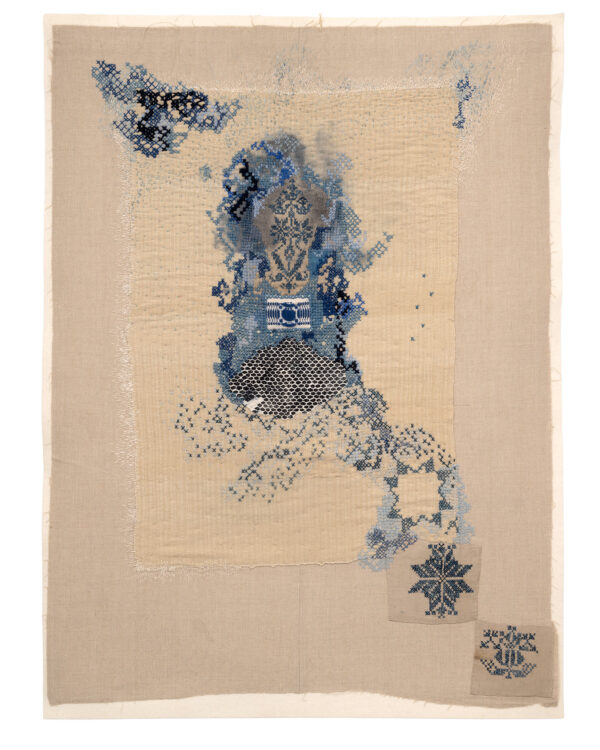
“her words first written in blue ink, written in water”, photo: Rik Sferra
For Amber Jensen, “weaving is an almost universal language. It’s been a way for me and others to bridge cultural divides, share our own unique experiences and learn about one another’s histories.”
Jensen grew up in the Midwest, and spent much of her young adulthood immersed in other American cultures–from the Pacific Northwest’s ethos of innovation and independence to the tightly-held, family-focused and often hidden traditions of the Appalachian South. Experiencing the different weaving traditions of these regions gave her insight into their shared practices, as well as the unique expressions of each community.
For Jensen, sharing weaving techniques is not merely a historical act. These are vibrant traditions have evolved and been shared across cultures for thousands of years. This history informs her daily artistic practice and approach to making. She draws on historical patterns —blending, overlapping, coloring-in, mending — and then adds her own innovations.
In her finished pieces, woven experiments are carefully hand-knotted back together to create patchwork matrices that resemble layers of a topographical map. Heavy woolen cross-stitching brings the composition together. This meticulous process requires both time and space, as she patiently pieces together European-American woven coverlet patterns and finely detailed sampler embroideries. By integrating her own sensibilities, Jensen allows the work to spill outward across the cloth, giving meaning to the act of stitching together diverse traditions into a new cohesive whole.
Returning to the Midwest renewed her interest in Scandinavian weaving heritage, which some of her ancestors practiced in Minnesota. Jensen began sharing these weaving traditions as an instructor at the North House Folk School in Grand Marais, Minnesota, where she also explored other folk craft traditions and the maritime culture of the Upper Midwest. Her work parallels the evolving traditions of Northern crafts, blending Native culture with Scandinavian and Germanic influences. For Jensen, this cultural overlap reinforced the importance of learning through relationships with those who share the land and creating new, distinct traditions together.
An important experience that informed her thinking occurred during a cultural interchange at All My Relations Arts in Minneapolis. Jensen recalls,
Jensen’s belief in the power that art—and weaving in particular—to bring people together speaks to her passion for the medium. Weaving is her language, and through sharing this practice with others, she continually finds inspiration to create new work.
2024
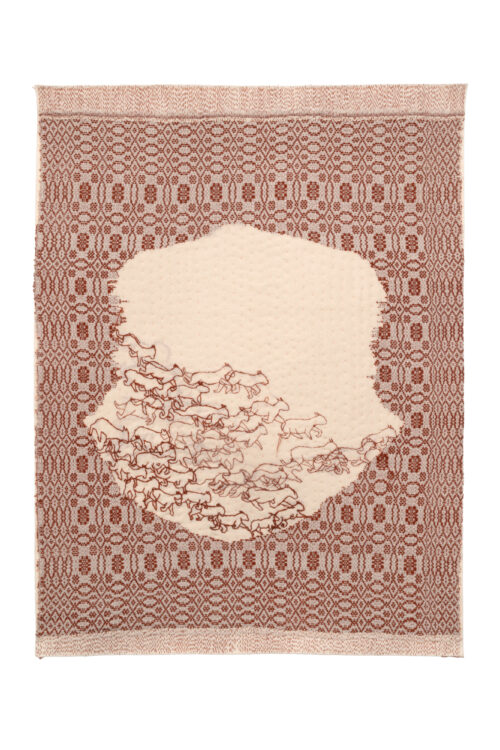
“round and round we spring, rumbling and rambling, surrounded in perfect symmetry”, photo: Rik Sferra
For more about Amber Jensen, visit AmberMJensen.com
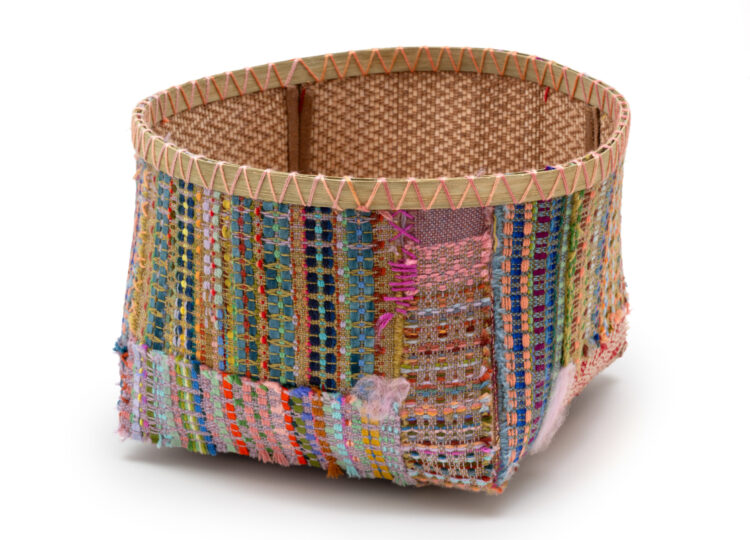
“covered with one age and another”, photo: Rik Sferra
Rick Kagigebi, 2024 McKnight Fiber Artist Fellow
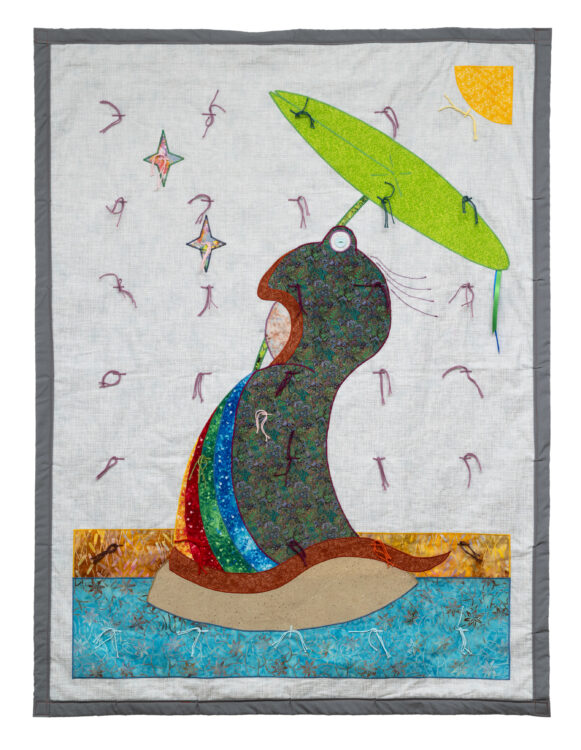
“Little Frog Girl: Going to Grandmother’s”, photo: Rik Sferra
“A blanket is a stopped moment in time.” Rick Kagigebi creates appliquéd mural blankets that tell stories through fabric, thread, and yarn. His work incorporates elements of direction, movement, time, space, three-dimensional layering, and Ojibwe culture. Beginning with a single idea, he sketches on large sheets of taped-together tag board, translating his vision into textiles. Guided by the question of what the blanket can provide to the person who will receive it, Kagigebi seeks to offer support for a good life through his creations.
Many hours are spent in shops selecting the right materials—fabrics with shifting shades of color, shiny zig-zag threads, and thoughtfully positioned yarn ties—all connecting one dimension to another. The design evolves during the creative process, requiring patience and making him wait until the right changes reveal themselves.
Kagigebi first made blankets as a teenager for ceremonial gifts. In his early thirties, living at the Duluth YWCA, he began making appliquéd mural blankets using an embroidery hoop to hand-stitch designs. Since then, he has consistently made new blankets with a sewing machine. Images of his gifted blankets do not exist, and he shares only what is culturally appropriate. Kagigebi explains,
Culturally, we’re taught to not talk about certain aspects of what we do. Also, I often feel that people won’t accept the spiritual influence in my artwork. For many years, people have told me that the blankets I’ve made helped them. Many commissioned blankets are personal blankets. People will wrap themselves up in the blanket when they need help. I’ve been told that being able to make these blankets is a unique gift that comes with the responsibility to help in this way.
Blankets are central to Indigenous life, serving as robes, bedding, and symbols of care. Babies are swaddled in their first blanket; spouses are wrapped together in wedding ceremonies. Within ceremony, blankets are offered as a sign of respect to spirit helpers and sent to distant communities carrying prayers and healing. They are imbued with medicine and prayers for long, good lives. When people die, they are wrapped in blankets for their journey home.
Kagigebi lives in Detroit Lakes and teaches basic sewing and a unique checkerboard blanket process at White Earth Reservation and Fargo Indigenous Association. Teaching fulfills another cultural expectation: passing skills to the next generation. Blanket-making is also a personal form of healing, and he hopes others will carry forward this way of helping through blankets. Reflecting on becoming an Elder, he is grateful for the feeling that Indigenous people become more useful to their communities as they get older. He says, “Non-natives are surprised that a man dedicates his life to making blankets, but I’ll continue this work for as long as I’m alive.”
2024
For more on Rick’s work, visit Rick Kagigebi
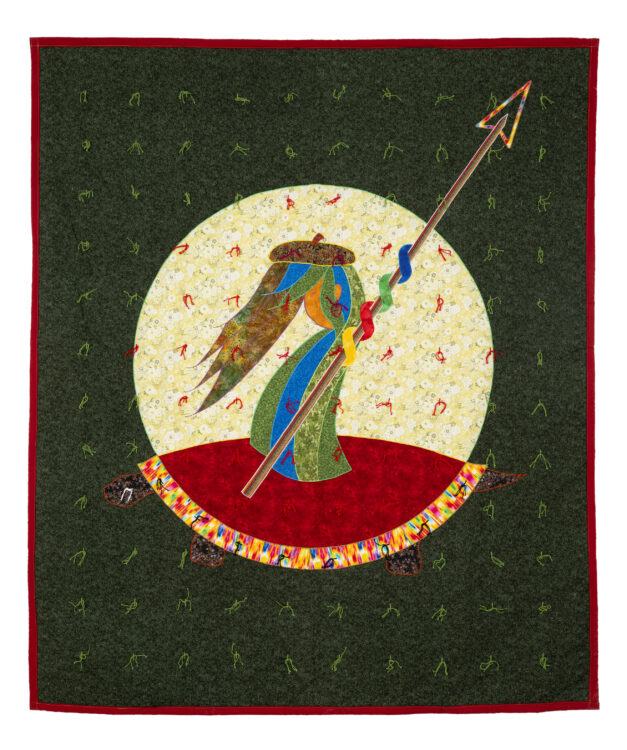
“The Forest Guardian”, photo: Joseph J. Allen
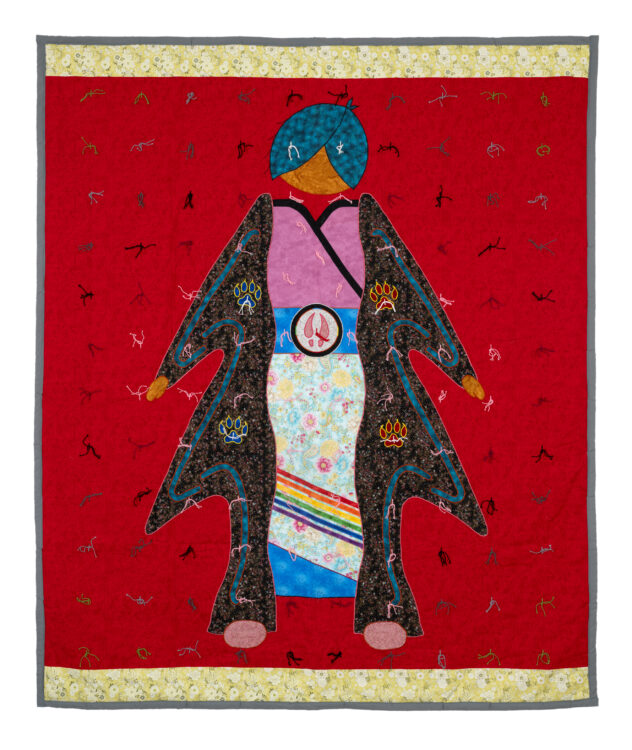
“Portal Into the Wood”, photo: Joseph J. Allen
